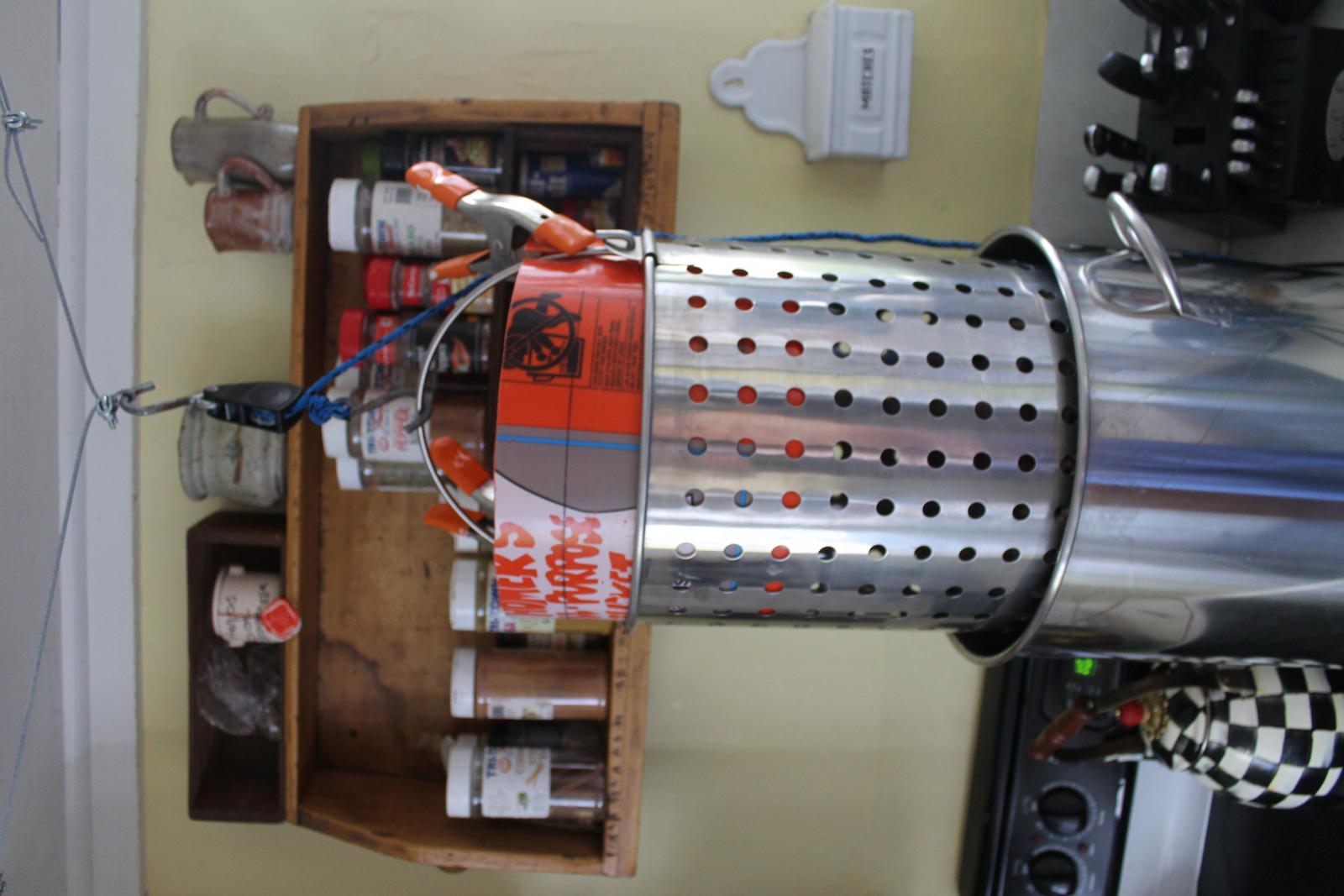I Have been BIAB brewing for a while and constantly seeking to improve my brewing or at least tinker with the process and kit.
I brew with a 30L (8 gal) kettle which is too small and this is forcing me to experiment with sparging techniques. I know I should just get a bigger kettle and will soon enough but that answer isn't enough to stop my interest in this idea (lets call it an academic thread).
My current process is fairly standard, heat 24L (5gal) of strike water, add grist, mash. Heat 8L (2 gal) of sparge water, Pull grains dunk and drain in the wort a couple of times then dunk in sparge water, drain over kettle, repeat 4-5 times. This gives me 26l (ish) (7gal) pre-boil with last runnings still in the 1.020's. This reading isn't entirely accurate as during the dunk/drain process some sugars do get left in the sparge water which turns it to wort, last time measuring 1.010 for the last wee bit which got thrown.
I can just boil 26l without boil over, and then dump it all into my fermenter with a supposed brewhouse efficiency of 80%. However Trub usually accounts for 10-15% of volume into the fermenter so really my efficiency is around 70% which can certainly be improved on.
This got me thinking that the dunk in the sparge water is inefficient and i need a way to mash and sparge with a max of 27L going into the kettle.
I figure that by placing a water spreading device on top of the mashed grains in the bag and plumbing it to a pump I can vorlauf and then fly sparge which should A) help clear my wort resulting in less trub in the fermenter and B) increase efficiency by allowing for better extraction.
The device itself I'm imagining to be circular, 6" diameter, with holes in it similar to a showerhead, or literally a showerhead. Connect to a pump and vorlauf from the kettle and then fly sparge from the HLT.
Thoughts?
And yes I know I should buy a bigger kettle because whats the point in BIAB if it's not a single vessel set up.
Also if anyone is not happy with the accuracy of the terms vorlauf or fly sparge in this application there is no need to tell me.
View attachment vorlauf.pdf
I brew with a 30L (8 gal) kettle which is too small and this is forcing me to experiment with sparging techniques. I know I should just get a bigger kettle and will soon enough but that answer isn't enough to stop my interest in this idea (lets call it an academic thread).
My current process is fairly standard, heat 24L (5gal) of strike water, add grist, mash. Heat 8L (2 gal) of sparge water, Pull grains dunk and drain in the wort a couple of times then dunk in sparge water, drain over kettle, repeat 4-5 times. This gives me 26l (ish) (7gal) pre-boil with last runnings still in the 1.020's. This reading isn't entirely accurate as during the dunk/drain process some sugars do get left in the sparge water which turns it to wort, last time measuring 1.010 for the last wee bit which got thrown.
I can just boil 26l without boil over, and then dump it all into my fermenter with a supposed brewhouse efficiency of 80%. However Trub usually accounts for 10-15% of volume into the fermenter so really my efficiency is around 70% which can certainly be improved on.
This got me thinking that the dunk in the sparge water is inefficient and i need a way to mash and sparge with a max of 27L going into the kettle.
I figure that by placing a water spreading device on top of the mashed grains in the bag and plumbing it to a pump I can vorlauf and then fly sparge which should A) help clear my wort resulting in less trub in the fermenter and B) increase efficiency by allowing for better extraction.
The device itself I'm imagining to be circular, 6" diameter, with holes in it similar to a showerhead, or literally a showerhead. Connect to a pump and vorlauf from the kettle and then fly sparge from the HLT.
Thoughts?
And yes I know I should buy a bigger kettle because whats the point in BIAB if it's not a single vessel set up.
Also if anyone is not happy with the accuracy of the terms vorlauf or fly sparge in this application there is no need to tell me.
View attachment vorlauf.pdf





